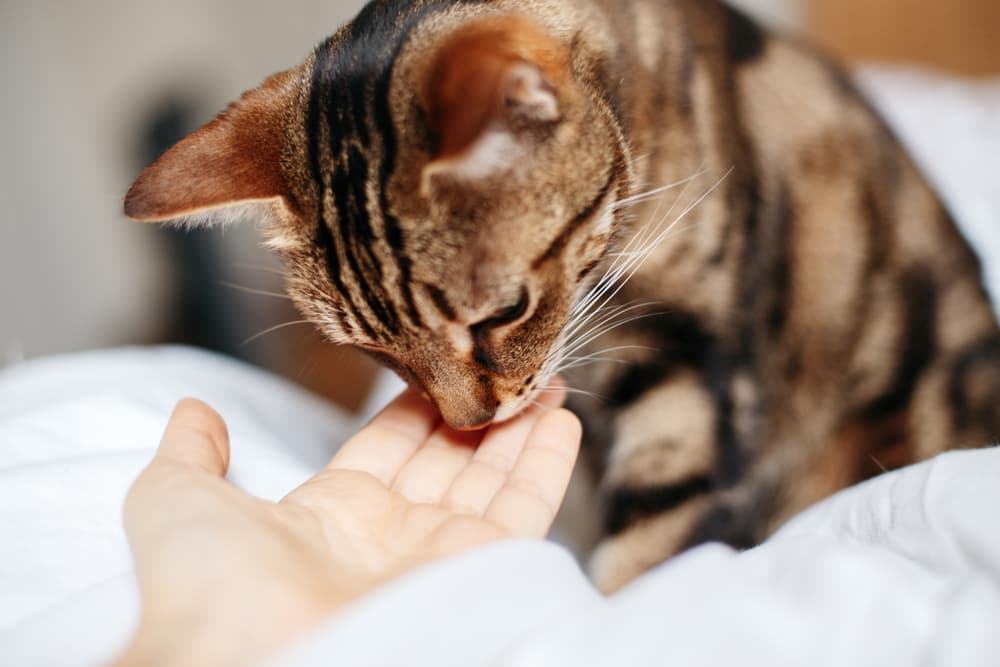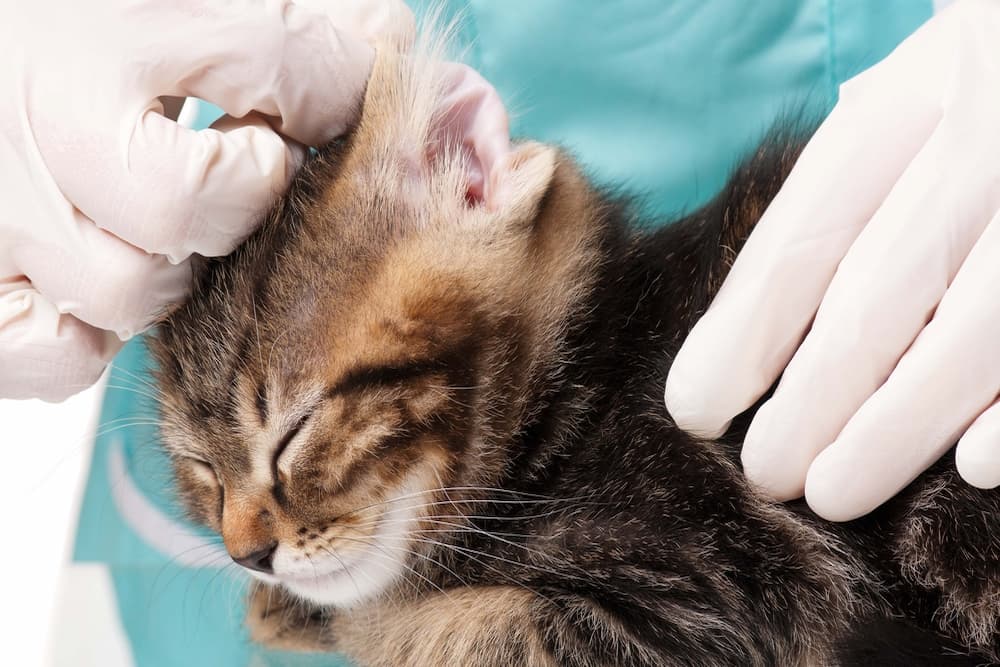How to Clean a Cat’s Ears

Cats have grooming nailed down to a science. With fine-tuned precision, they use their tongues to remove dirt, debris and parasites, clean infected areas, and distribute oils that give their coats that brilliant shine. One area they can’t reach is their ears, which is where we humans come in. Cleaning a cat’s ears incorrectly, however, could cause damage, some of it severe or irreversible.
If you’d like to learn how to clean a cat’s ears, we’ve laid out all you need to do it safely and effectively. Since each cat has individual cleaning needs, we recommend asking your veterinarian for guidance.
Should You Clean a Cat’s Ears?

It really depends on the individual cat, says Dr. Gabrielle Fadl, a veterinarian with BondVet in New York City. “Some cats who have had frequent ear infections may need their ears cleaned on a regular basis to prevent further issues. For other cats, they may just need their ears cleaned once in a while—on a much less frequent basis, or intermittently on an as-needed basis.”
Generally, you want to avoid cleaning your cat’s ears unless there’s a lot of buildup or if the cat has a history of ear infections, says Dr. Lisa Goin, a partner doctor with Heart + Paw in Glen Mills, Pennsylvania. “Cat ears are very sensitive, and damage can be done from cleaning their ears incorrectly or too aggressively.”
It’s always a good idea to check with your veterinarian before proceeding. “I recommend visiting a vet first if there are concerns for the ears to determine if cleaning is the appropriate thing to do and ensure there is no infection,” says Goin.
Should You Clean a Cat’s Ears at Home?
Though many pet parents can learn to clean cat ears at home, some prefer to work with a professional, says Fadl. “This comes down to personal preference and how cooperative the cat is.”
A benefit of visiting your veterinarian before going solo is that they can demonstrate proper technique, says Goin.
If your veterinarian recommends ear cleanings for your cat, another option is to book an appointment with a professional pet groomer for a demonstration.
Cleaning a Cat’s Ears: What You’ll Need

Cleaning dirty cat ears requires just a few basic items.
A Veterinarian-Recommended Cat Ear Cleaner
A good cat ear cleaner will help loosen that hard-to see (and reach) dirt, says Fadl. It’s essential, she says, to purchase a cleaner designed for pets, “because it is self-drying and will help regulate the pH inside the ear canal.”
Products like hydrogen peroxide or vinegar can irritate sensitive cat ears, so veterinarians recommend against using them.
Cotton Balls
These are used to wipe away debris and can also be used to apply cleaner into the ear.
A Favorite Cat Treat

Cat treats can help ear cleanings be more enjoyable and allow your cat to view them more positively, veterinarians say.
A Bath Towel
Some veterinarians recommend gently wrapping the cat in a towel to help your cat feel more secure. If anything, you’ll need a towel for cleaning up the mess.
A Room You Don’t Mind Getting Wet
Given that cleaning dirty cat ears can be a messy business, you may want to choose to do it in a bathroom.
How to Clean a Cat’s Ears

If you feel comfortable going solo and your cat’s ears are otherwise healthy (per your veterinarian), here are simple steps you can try at home.
Step 1: Check Your Cat’s Stress Levels
Postpone the cleaning if your cat appears too stressed, recommends Goin. “The owner should stop and give them a break for 24 hours.”
Step 2: Check for Ear Infections
Check your cat’s ears for swelling, scratching, head shaking, excessive ear wax buildup, ear discharge, or anything that might indicate an infection, ear mites, or another ear health issue. If you notice anything out of the ordinary, contact your veterinarian before attempting to clean your cat’s ears.
Step 3: Pour the Cleaner into Your Cat’s Ears
Start by gently holding your cat’s ear flap back. Then using a cat ear cleaner, Fadl recommends pouring a small amount directly into the ear canal. Then, massage your cat’s ear to allow the cleaner to work its way deep into the ear and to help to break up ear wax. Repeat for the other ear.
Many cats don’t like this technique, however, Fadl says.
“An easier method is to saturate a cotton ball, then place the cotton ball in the cat’s ear and massage. That way, the liquid gradually seeps in while the cat enjoys an ear massage.”
Step 4: Prepare for Your Cat to Shake His Head
At this point, your cat will probably shake his head, emitting cleaner and ear gunk everywhere, says Fadl. “It’s a good idea to clean the ears in the bathroom or another area that is easy to clean up.”
Step 5: Wipe Off Remaining Debris
Take a dry cotton ball and gently wipe out the parts of the ear canal you can see, Fadl advises.
How to Clean a Kitten’s Ears

The process for cleaning a kitten’s ears is basically the same as for adult cat ears, except that with kittens you’ll need to be especially gentle, says Fadl. She offers tips for making the experience as enjoyable as possible.
“Offer playtime, praise, and special treats. Consider breaking down the process and only cleaning one ear at a time. By making the process as stress-free (and even fun) as possible, you could be setting your cat up for a lifetime of ear cleanings that aren’t a struggle.”
Cat Ear Cleaning: Safety Tips

To help ensure a safe and stress-less experience, consider these veterinarian-recommended tips.
Start With Your Veterinarian
Your veterinarian can advise on how often to clean your cat’s ears, recommend the best cleaning product for your cat, and provide calming medications, if necessary. “If nothing else, the vet team can give you a demonstration of how to clean your cat’s ears, along with additional tips,” says Fadl.
Avoid Cleaning Cat Ears That Appear Infected or Abnormal
An infection could make ear cleanings extremely painful, since the ear canals may be bleeding or inflamed, says Fadl. If the infection is so severe that the eardrum is ruptured, cleaning it, she says, would cause the cleaner to seep into the deeper parts of the ear. And without protection provided by the eardrum, that could lead to hearing loss or neurological symptoms.
“If a cat has severe symptoms, or if they’re very uncomfortable during their ear cleanings, it’s best to seek a veterinary consultation as your cat’s ears could be infected or have another issue,” she recommends.
Be Careful When Using Cotton Swabs
The same rules about sticking cotton swabs into our ears apply to cats. Veterinarians recommend avoiding them or being judicious when using them. “Only use cotton-tipped applicators on the parts of the ear you can see. Don’t stick them deep down into the ear canal, as this can cause damage,” says Fadl.
Postpone the Ear Cleaning if Your Cat is Stressed
If your cat appears too stressed, Goin suggests stopping and giving him a break for 24 hours. Additionally, “Vets can prescribe calming medication to help it go smoother if they are very stressed with cleansing.”









